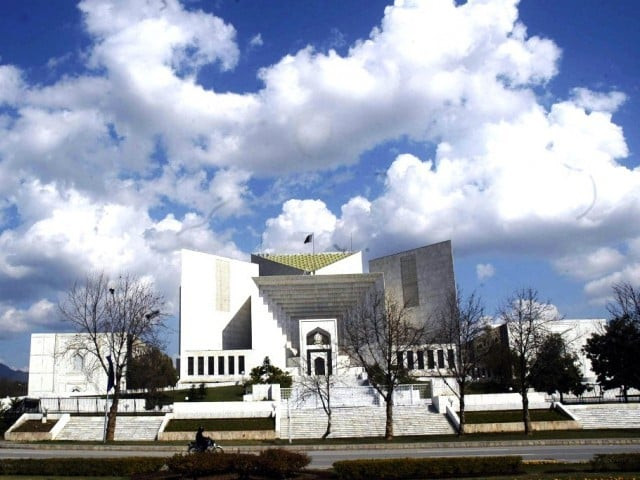Under the microscope: SC judge raises questions on judiciary’s accountability
Judiciary need not confer more powers on itself, says Justice Mian Saqib Nisar.

Supreme Court. PHOTO: EXPRESS/FILE
“The judiciary in Pakistan is uniquely positioned. If compared with other judicial institutions around the world, it will be noted that there is no parallel for a judiciary which is appointed by the judiciary and is answerable to the judiciary,” Justice Mian Saqib Nisar said.
“I would respectfully venture to suggest that we have sufficient judicial power already and do not need to confer further power on ourselves by clutching at the basic structure doctrine”.
His observations came in his 127-page additional note in the 18th and 21st constitutional amendment cases.
The judge further observed that it is not the function of the Supreme Court to weaken democratic institutions and traditions by declaring that the elected representatives of the people are not, in its opinion, discharging their functions honestly. Hence those functions in relation to the judiciary will be taken over by the judiciary itself.
“Let it not be forgotten that the judiciary in Pakistan is neither elected by the people nor is it answerable or accountable to the people. It is answerable only to itself under Article 209 of the Constitution”, he adds.

Justice Saqib stated that a powerful judiciary is not necessarily an independent judiciary and conversely, an independent judiciary is not necessarily a powerful judiciary.
The judge further stated that no judge of a superior court in Pakistan has ever been prosecuted in a criminal court.
“The judiciary in Pakistan thus holds a uniquely privileged position constitutionally and it is therefore incumbent on it to exercise its great powers with restraint and wisdom.”
The judge said that in other countries of the world, including India, the general rule is that the superior judiciary is answerable to the elected representatives of the people. He quoted examples of India, England and in the United States of America.
“The judiciary in Pakistan thus holds a uniquely privileged position constitutionally. It is therefore incumbent on it to exercise its great powers with restraint and wisdom. The basic postulate, on which all institutions rest, is, the greater the power, the greater the responsibility”
The judge also believed that the Objectives Resolution does not state that the authority is to be exercised by the judicial officers appointed by the State.
In the context of judicial independence, Justice Saqib noted that the SC has shown extreme sensitivity on the issue. Even the registrar has been directed not to appear before the public accounts committee of parliament which scrutinizes the budgets and expenditures of all government departments.
He said that the repository of ultimate power is the body of elected representatives; therefore, the final word must always therefore rest with them and with no one else. The judicial organ of the State cannot, and ought not, to claim that it is the ultimate authority in the land. Such a claim would be clearly violating explicit language of the Resolution”
The judge also criticised the top court’s judgment in Zafar Ali Shah case, wherein the court had validated the acts of military dictator. He said that the judiciary is a creature of the constitution as it is not above it.
Published in The Express Tribune, August 10th, 2015.


















COMMENTS
Comments are moderated and generally will be posted if they are on-topic and not abusive.
For more information, please see our Comments FAQ